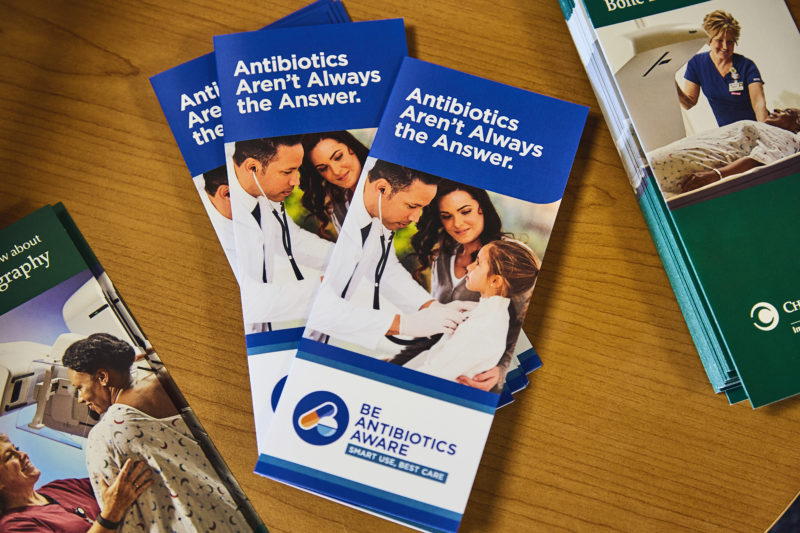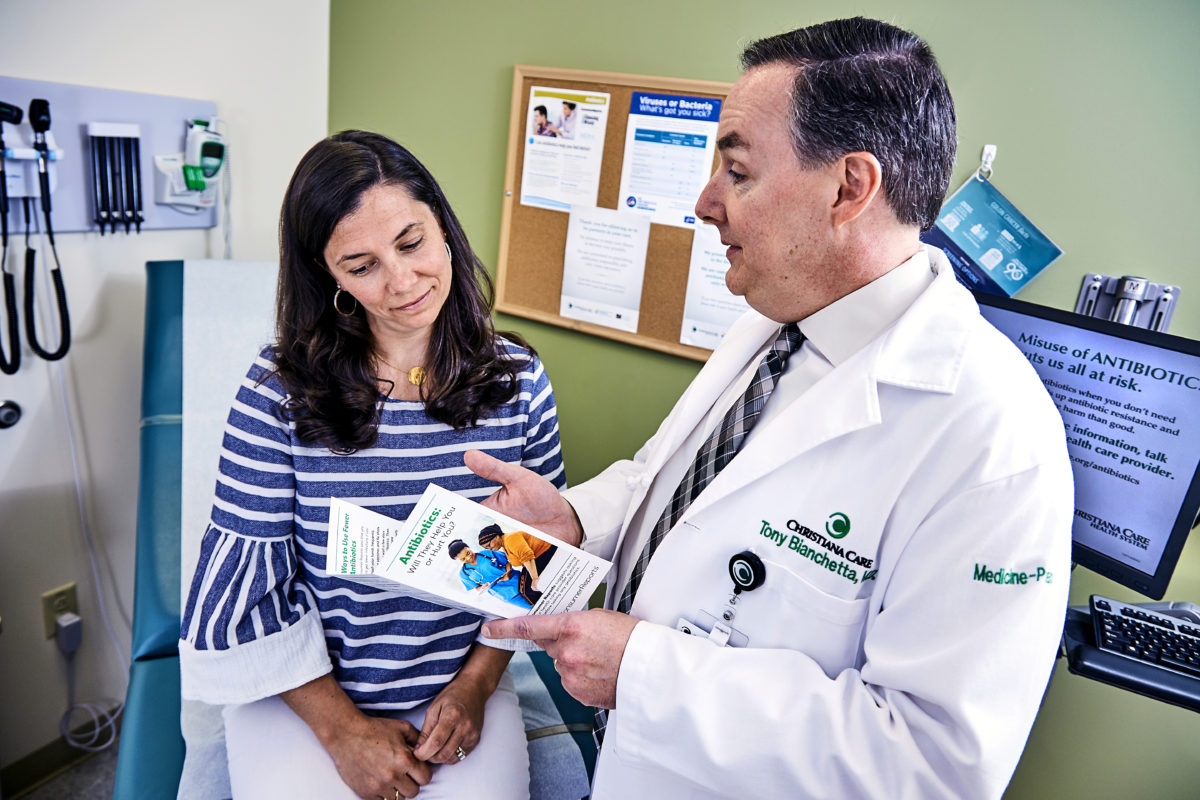Coughs and colds from viral infections are a common complaint at Christiana Care’s Medical Aid Units, and if people have been feeling lousy and staying in bed, they just might ask Hal P. Kramer, M.D., for an antibiotic.
As lead physician of the Medical Aid Units, Dr. Kramer and the team of clinicians are accustomed to seizing on such a request as an opportunity for patient education on the proper use of antibiotics and to practice the gentle art of saying ‘No.’ Typically, the clinicians will empathize with how crummy a patient feels, explain that upper respiratory and sinus infections are caused by viruses and work to make the situation better.
Potential for harm
The clinicians also explain that antibiotics will not help a viral respiratory infection, but they do have the potential for harm — if bacteria mutate and become resistant to antibiotics because of their overuse.
“We validate how patients feel and reassure them that they will feel better soon while giving them the right tool to achieve the right result,” said Dr. Kramer, a vocal advocate for antibiotic stewardship.
Dr. Kramer is part of an intensive effort within Christiana Care to educate clinicians and patients about the appropriate use of antibiotics. Since the discovery of penicillin in 1928, antibiotics have been considered a low-risk public health tool. But the U.S. Centers for Disease Control and Prevention now estimates that more than 30 percent of antibiotics are inappropriately prescribed. Patients often ask for antibiotics when they will not be effective for their complaint.
One result of this misuse is the emergence of drug-resistant bacteria. About 2 million people annually become infected with bacteria resistant to antibiotics. These infections can lead to increased hospital stays, life-threatening illnesses and death.
“In general, both patients and providers have recognized that antibiotic overuse is a problem – but they may have thought, ‘It’s not my problem.’ However, we are changing that through education and awareness,” said Marci Drees, M.D., MS, FACP, DTMH, infection prevention officer and hospital epidemiologist at Christiana Care.
Today the stewardship effort within the Medical Aid Units is one part of a multifaceted approach that began inside the hospitals, in the medical and surgical service lines, and has blossomed into other areas.
Be antibiotic aware
David Cohen, M.D., Infectious Diseases section chief and co-chair of Christiana Care’s Antimicrobial Stewardship Program, has been an innovative leader in education through the use of electronic quizzes and quarterly lectures. This spring there will be increased attention given to primary care physicians, urging them to “Be Antibiotic Aware,” through education programs held in their offices. The idea is to empower clinicians, not hover over them.
“We are saying to providers, including nurses, that stewardship is not something we do to you or for you, but something we need to do with you,” said Nicole Harrington, Pharm. D., BCPS, a clinical pharmacy specialist in Infectious Diseases and co-chair of the Antimicrobial Stewardship Program.
During the past year, Christiana Care has also strengthened its antibiotic stewardship with four other hospital systems in Delaware through the eBrightHealth Alliance “Choosing Wisely Initiative.” EBrightHealth is an innovative learning partnership that addresses issues vital to the entire state. It includes Bayhealth, Beebe Healthcare, Nanticoke Health Services and Nemours/Alfred I. duPont Hospital for Children. EBrightHealth also collaborates with organizations such as the Delaware Division of Public Health, Delaware Health Information Network, Delaware Healthcare Facilities Association and Quality Insights, a non-profit that strives to improve the services of Medicare and Medicaid.
For this stewardship effort, eBrightHealth is focused on reducing inappropriate antibiotic treatment of viral upper respiratory infections in the outpatient setting and discontinuing the use of empiric antibiotics beyond 72 hours in hospitalized patients with no clear evidence of infection. That’s because with cultures available within 72 hours, clinicians can often narrow the target of what they are treating or stop antiobiotics entirely.
Choosing Wisely Initiative
EBrightHealth leaders are also scouting for educational videos, posters and brochures so the state’s health organizations can speak with one voice on antibiotic stewardship, said Robert Dressler, M.D., MBA, quality and safety officer, Christiana Care iLEAD, and team leader for the Choosing Wisely Initiative. “Each hospital team is also tailoring its approach to that health system’s resources and needs,” he said.
The work on antibiotic stewardship has had strong support from Pharmacy Services and Infectious Diseases. Partners include Jillian Dougherty, Pharm.D., BCPS, clinical pharmacy specialist, Infectious Diseases; Julianne Gardner, Pharm.D., clinical pharmacy specialist, Infectious Diseases; and Ken Silverstein, M.D., MBA, chief clinical officer and a strong advocate for Choosing Wisely.
“We are moving on many levels because everything is connected, whether it is inpatient care, outpatient care or nursing home care,” said Dr. Drees, who is working on implementing Choosing Wisely for ambulatory patients. “We have to address the use of antibiotics with clinicians and patients throughout the health care system if we are to be effective at reducing the inappropriate use of these medications in Delaware.”
In 2015, the “National Action Plan for Combating Antibiotic-Resistant Bacteria,” written under the Obama administration, set a goal for all hospitals to have antibiotic stewardship programs to help reduce inappropriate antibiotic prescriptions by 20 percent by 2020. Already, the Joint Commission, which accredits and certifies nearly 21,000 health care organizations, has begun to include antibiotic stewardship in its standards.
In February, Dr. Kramer presented data on the success of the Medical Aid Units in meeting Joint Commission standards during a CMS (Centers for Medicare & Medicaid Services) Quality Conference in Baltimore. The latest data for the Medical Aid Units show:
- When comparing the period of January-to-June 2017 to July-to-December 2017, the total use of antibiotics decreased by 25 percent.
- In the same comparison period, the total use of azithromycin decreased by 44 percent.
- The antibiotic prescription rate decreased to 35 antibiotics per 100 visits in March 2018, compared to 67 per 100 visits in December 2016, before the intervention was implemented. That’s a decrease of 48 percent.
- Specifically, the azithromycin prescription rate decreased to three antibiotics per 100 visits in March 2018, compared to 13 per 100 visits in December 2016. That decrease is a drop of 77 percent.
Dr. Kramer says that the antibiotic intervention has achieved medicine’s Quadruple Aim of improving quality and safety, reducing costs, enhancing the patient experience and, as providers observe the continuous improvement in care, making medicine a more joyful experience for clinicians.
“What Dr. Kramer has done is groundbreaking at Christiana Care, and it is a credit to his leadership,” said Dr. Dressler, who hopes to see more analytic data on how best to implement antibiotic stewardship to foster even greater improvement throughout the hospital system.
Within the Medical Aid Units there is agreement among the 30 providers that close collaboration is important to bring about antibiotic stewardship. The team has also engaged in lots of basic education for patients who often expect to be given an antibiotic for viral infections.

“It helps to have brochures, posters in the waiting room and displays in the exam room on proper antibiotic use and to point out that the CDC has made reducing the inappropriate use of antibiotics a national priority,” said Dr. Kramer, who adds that changes are being made without any compromise to the health of patients.
The clinicians work on disease protocols to make sure a diagnosis is correct, the antibiotic choice is correct and the duration of treatment is correct. And it helps that there is a Patient Commitment Letter posted in the Medical Aid Units and signed by Christiana Care Medical Aid Unit Providers. The letter reads: “Thank you for allowing us to be partners in your care. We promise to treat your illness in the best way possible. We are committed to prescribing antibiotics responsibly and only when needed.”
Antibiotic Stewardship at a glance
Antibiotic Stewardship is an effort to improve antibiotic use by clinicians and patients so that antibiotics are only prescribed and used when needed.
- Patient education is vital. Videos, brochures and posters in a medical office reinforce the positive message that clinicians are sending about making the right diagnosis and providing the right medication for the right duration.
- When a patient expects an antibiotic, it is important to validate the patient’s reasons for seeking help even if their complaint won’t be helped by the medication being sought. “I can see that you are suffering from a bad cold and very much want relief. However, an antibiotic is not going to relieve your symptoms since your infection is viral. Let’s find what will work best for you.”
- It is also helpful to inform patients about efforts by the U.S. Centers for Disease Control and Prevention to avert a health care crisis through the appropriate use of antibiotics. This is a national priority, for any time antibiotics are used they can cause side effects and lead to antibiotic resistance.
- Antibiotic resistance is one of the most urgent threats to the public’s health, as it means that bacteria have become resistant to the antibiotics designed to kill them. And when bacteria become resistant, antibiotics cannot fight them, and the bacteria multiply. Some resistant bacteria can be harder to treat, leading to increased hospitalizations, and early death.


